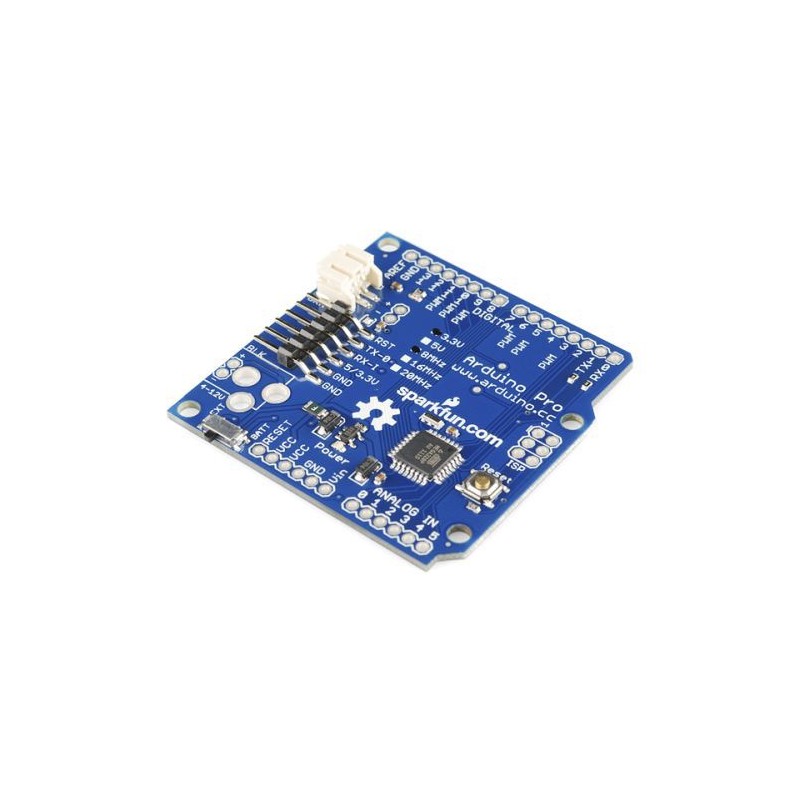



zł76.34 tax excl.
SparkFun DEV-10914 is a compact development board with an ATmega328 and 3.3 V logic level, equipped with basic protection and designed to work with an external USB–UART interface. It is suitable for applications requiring cooperation with low-voltage modules.
Development board with an ATmega328 microcontroller clocked at 8 MHz, adapted for operation with a 3.3 V logic level. The design enables cooperation with modules and shields requiring low-voltage signals. To reduce costs, no pre-soldered connectors or power socket have been used, but mounting pads are provided to allow their addition. Programming is possible via an external USB–UART converter connected to pins in the standard pin layout. The board features reverse polarity protection and a fuse protecting against short-circuit effects, as well as a power source selection switch.
Data sheet
Manufacturer BTC Korporacja sp. z o. o. Lwowska 5 05-120 Legionowo Poland sprzedaz@kamami.pl 22 767 36 20
Responsible person BTC Korporacja sp. z o. o. Lwowska 5 05-120 Legionowo Poland sprzedaz@kamami.pl 22 767 36 20
No product available!
This board combines the simplicity of the UNO’s Optiboot bootloader (which is used in the Pro series), the stability of the FTDI (which we all missed after the Duemilanove was discontinued) and the R3 shield compatibility of the latest Arduino UNO R3. SparkFun DEV-13975
Qduino Mini is a tiny, Arduino-compatible board with ATmega32u4 (8MHz, 32kB Flash, 2kB RAM), a LiPol battery connector and charger built-in. SparkFun DEV-13614
The SparkFun AST-CAN485 board is a miniature Arduino in a compact Pro Mini housing with a built-in CAN (Control Area Network) and RS485 ports. Sparkfun DEV-14483
Pro Micro is similar to Pro Mini Arduino compatible board, main difference is that Pro Micro uses ATmega32u4 with builtin USB connectivity. Sparkfun DEV-12640
No product available!
Base board compatible with Arduino. It was equipped with an Atmega 328P microcontroller. It has 14 I/O lines (including 6 PWM channels) and 6 analog inputs. SparkFun DEV-14525
Base board compatible with Arduino. It was equipped with the ATSAMD21G18 microcontroller. It has 26 I/O lines and 14 analog inputs. SparkFun DEV-14812
No product available!
A small module, matching the breadboard, containing a 32-bit microcontroller with ARM Cortex M7 core. PJRC TEENSY40
Evaluation kit with Sparkfun Artemis Bluetooth 5.0 module designed on the basis of the Arduino UNO kit. It has a USB C. The board also has a USB-UART converter, a microphone and a JTAG debugging connector. Artemis has support in the Arduino IDE. SparkFun DEV-15444
Evaluation kit with Sparkfun Artemis Bluetooth 5.0 module designed on the basis of the Arduino Nano kit. It has a USB C. The board also has a USB-UART converter, a microphone, Lipo battery charging and a JTAG debugging connector. Artemis has support in the Arduino IDE. SparkFun DEV-15443
Evaluation kit with Sparkfun Artemis Bluetooth 5.0 module designed on the basis of the Feather kit. It has a USB C. The board also has a USB-UART converter, a microphone and a JTAG debugging connector. Artemis has support in the Arduino IDE. SparkFun WRL-15574
Evaluation kit with Sparkfun Artemis Bluetooth 5.0 module designed on the basis of the Arduino Mega kit. It has a USB C. The board also has a USB-UART converter, a microphone and a JTAG debugging connector. Artemis has support in the Arduino IDE. SparkFun DEV-15442
Pro Micro is similar to Pro Mini Arduino compatible board, main difference is that Pro Micro uses ATmega32u4 with builtin USB connectivity. Sparkfun DEV – 12587
No product available!
A small module matching the contact plate based on a 32-bit microcontroller with ARM Cortex M7 core. Has a microSD slot. PJRC TEENSY41
Board with the ATmega328 microcontroller from the AVR family, there are 20 I/O lines, 6 PWM channels, 6 analog inputs at the user\'s disposal. SparkFun DEV-15123
Development kit with ATSAMD21E microcontroller with ARM Cortex M0+ core. The chip can be clocked at 48 MHz, has a built-in 256 KB of Flash memory and 32 KB of SRAM. The module has a Qwiic connector. SparkFun DEV-15423

SparkFun DEV-10914 is a compact development board with an ATmega328 and 3.3 V logic level, equipped with basic protection and designed to work with an external USB–UART interface. It is suitable for applications requiring cooperation with low-voltage modules.
